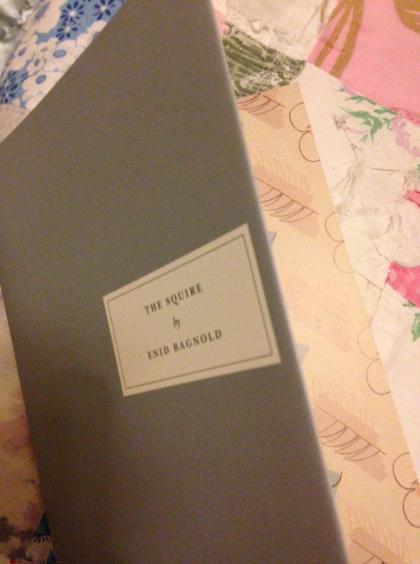
A book about the experience of pregnancy and childbirth is not something that would ordinarily be on the top of my reading pile, but Persephone’s latest republished novel by Enid Bagnold is an exception in every way. It has many parallels with Virginia Woolf’s later style of writing; the poetical prose, the stream of consciousness narrative, the wide cast of characters who flit in and out of the action, the matriarchal anchor and the world of unquestioned and unquestioning privilege all feature, creating an exquisitely lovely, quintessentially pre-war vision of a vanished society drenched in dappled sunlight and clothed in white dresses. There is much that can irk the modern day reader within its pages; the army of servants and nannies the Squire has at her disposal and the petty worries that fill her otherwise leisurely days are a far cry from the all consuming demands of modern motherhood, which leave few women with the opportunity to sit and philosophise on their place in the world. However, this shouldn’t detract from the essential power of the novel, which is in its beautiful and sensitive exploration of the emotional and physical connection between mothers and their children.
The Squire lives in a large house in a rural village by the sea. Her husband has gone on his annual three month business trip to India, leaving her in sole charge of their home, children and servants as she enters the final days of her fifth pregnancy. The Squire, practised at childbirth, has no anxieties as she approaches her labour; instead, she draws into herself, preoccupied with thoughts of her children and her place in their world. Around her, however, all is falling apart; the Cook, horrified at the thought of a labor in the house, resigns. The butler is being difficult. The maids are in mutiny. The children demand attention. Her close friend Caroline is having a romantic crisis. Letters must be written, temporaries interviewed, tempers soothed, hearts consoled and personalities managed, but the Squire, detached from it all in her complete envelopment in her coming child, takes it effortlessly in her stride.
When the midwife arrives, the Squire is free to fully absent herself from the cares of the household and subsume her whole mind into the process of giving birth. The midwife, an old hand and an old friend, sees childbirth and the care of the mother and baby as the greatest vocation offered to a woman, and the discussions the two have about the role of mothers and the change in women’s priorities as they move through the different stages of life provide the most thought provoking moments in the novel. Within hours of the midwife’s arrival, the Squire goes into labour, and while much is left to the imagination, there is still enough described to allow the reader to enter into the experience and understand the emotional and physical sensations of childbirth, which was incredibly daring for the time. After the birth, the Squire is able to indulge in days of enforced bed rest where she is allowed to recover and bond with her baby in peace; these precious moments form the foundation of their relationship and give the Squire hours on which to meditate on her hopes and dreams for her children, and her role in their life and in the lives of those who will follow. Throughout these days, the only reality that matters is the Squire’s precious baby; all the trivial concerns of everyday life are kept behind closed doors, at bay until the Squire is ready to go back and face the world.
There is much within the pages of this novel to enjoy and contemplate upon. I mainly enjoyed the novel for its gorgeous, lyrical style and for its beautifully expressed, insightful thoughts on the many ways in which women interact with themselves, each other and their children. It’s certainly not a novel you can only appreciate and enjoy if you’re already a mother; there is something in here for women at all stages of life. Having said that, though, this is a very class bound book, and as much as Bagnold was daring and forward thinking in her discussion of birth and breastfeeding and such, she is also rather disparaging in her depiction of the mean-spirited and little-minded servants and dismissive of women who are not mothers and therefore have not graduated to the supreme class of womanhood the Squire belongs to.
There is an occasional note of superiority and smugness in her prose that did nag at me throughout; perhaps this book did not reach the heights of success she hoped for because her saintly depiction of mothers and motherhood is only true for those able to afford to absent themselves from all but the most pleasurable tasks. The Squire, after all, does not have to deal with wet nappies or children who are ill in the night; she does not have to scrape up a child’s dinner from where it has been flung or negotiate a trip to the shops with her five children running amok around her. She can pick and choose her duties; this is what makes The Squire both a hauntingly beautiful depiction of the glories of children and a rather irritatingly smug portrait of the ease of life for the wealthy. Despite my misgivings, however, I still found this a marvelous book, and one that will probably continue to offer wisdom and inspiration as I grow older. Like Richmal Crompton, Bagnold is brilliant at depicting the inner life of children, and even if there is a Nanny to do all the hard graft, you can’t help but feel the love Bagnold had for her children oozing from the pages. This is probably one of my favorite new Persephones for quite some time; definitely not one to be missed.
